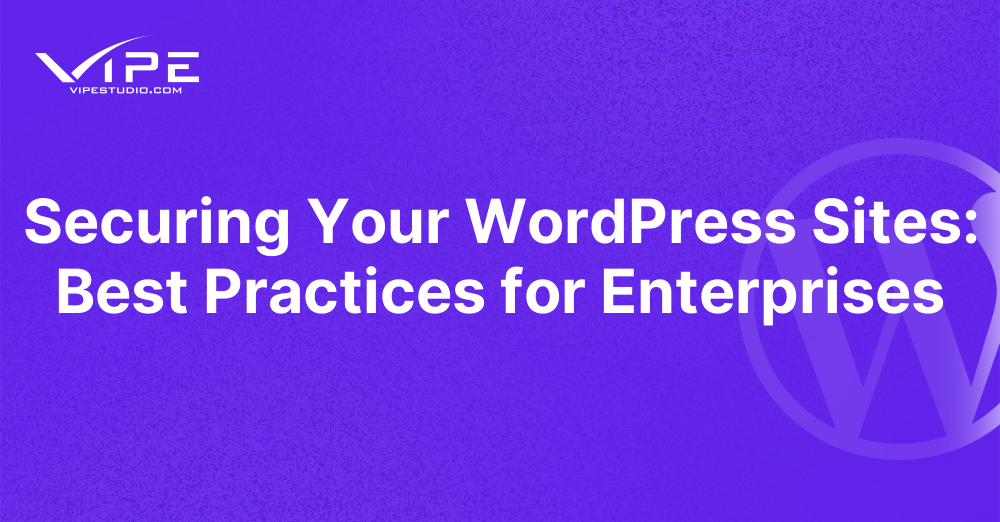26.02.2024
WordPress Development
Securing Your WordPress Sites: Best Practices for Enterprises
READING TIME: MIN
Table of Content
The security landscape of the internet is fraught with challenges, and enterprises relying on WordPress must prioritize robust security measures to safeguard their online assets. In this blog, our experts at Enterprise WordPress Agency for Custom Development will tell you about some practices for securing WordPress sites, ensuring a resilient defense against potential threats. As the digital landscape evolves, the sophistication of cyber threats increases, making it imperative for enterprises to stay ahead in terms of security.
By adopting proactive measures and incorporating the latest security protocols, businesses can fortify their WordPress sites against emerging threats, fostering a secure and trustworthy online environment for both themselves and their users.
Regular Updates and Patch Management
One of the foundational pillars of WordPress security is regular updates and patch management. Ensuring that WordPress core, themes, and plugins are up-to-date is crucial. Developers regularly release updates to address vulnerabilities and enhance security features. By promptly applying these updates, enterprises fortify their websites against potential exploits. Automated update tools and monitoring mechanisms can streamline this process, providing a proactive defense against evolving cyber threats.
Strong Authentication Protocols
Authentication is the first line of defense for any website. Enterprises should implement robust authentication protocols, including complex passwords, multi-factor authentication (MFA), and user role management. MFA adds an additional layer of security by requiring users to verify their identity through multiple means, such as a password and a one-time code sent to a mobile device. Restricting user roles based on job responsibilities ensures that each user has access only to the necessary features, minimizing the risk of unauthorized access.
Firewall Implementation
Firewalls act as a barrier between your WordPress site and potential threats. Web Application Firewalls (WAFs) specifically designed for WordPress can filter and monitor incoming traffic, blocking malicious requests and protecting against common vulnerabilities. WAFs analyze HTTP traffic and can prevent SQL injection, cross-site scripting, and other attacks. Integrating a robust firewall solution into your WordPress security strategy provides an additional layer of defense against both known and emerging threats.
Regular Security Audits and Monitoring
Proactive security measures involve regular security audits and continuous monitoring. Conducting thorough security audits helps identify vulnerabilities, outdated components, or suspicious activities. Tools like security scanners and vulnerability assessment tools can automate this process, providing real-time insights into the security posture of the WordPress site. Continuous monitoring, through tools or services, allows enterprises to detect and respond to security incidents promptly, minimizing potential damage.
Data Encryption and SSL Certificates
Data encryption is paramount in protecting sensitive information transmitted between users and the website. Implementing Secure Sockets Layer (SSL) certificates ensures that data is encrypted during transit, making it challenging for malicious actors to intercept or manipulate. Beyond securing user data, having an SSL certificate positively impacts search engine rankings, emphasizing the importance of encryption in both user security and overall website visibility. Enterprises should prioritize the adoption of SSL certificates as a fundamental aspect of their WordPress security strategy.
Backup and Disaster Recovery Plans
Despite robust security measures, the unexpected can occur. Enterprises must implement comprehensive backup and disaster recovery plans. Regularly backing up WordPress sites ensures that, in the event of a security breach or data loss, the site can be restored to a known, secure state. Offsite backups, preferably in a secure cloud environment, enhance data redundancy and accessibility. Enterprises should periodically test their disaster recovery plans to validate their effectiveness and ensure a swift response in case of emergencies.
WP Security by our Enterprise WordPress Agency for Custom Development
Safeguarding your WordPress sites is not just a priority but a necessity, especially for enterprises operating in today’s cyber landscape. At our Enterprise WordPress Agency for Custom Development, we prioritize the fortification of your online assets with industry-leading security practices tailored specifically for enterprise-level needs. With our team of seasoned professionals at the helm, our Enterprise WordPress Agency for Custom Development ensures that every aspect of your WordPress sites is meticulously fortified against potential threats, utilizing cutting-edge security measures and custom-developed solutions.
Trust in our Enterprise WordPress Agency for Custom Development to deliver comprehensive protection for your digital infrastructure, providing peace of mind in an increasingly volatile online environment. Don’t leave your enterprise vulnerable to cyber risks; partner with our Enterprise WordPress Agency for Custom Development today and safeguard your online presence with confidence.
Conclusion
In conclusion, securing WordPress sites for enterprises demands a multifaceted approach. Regular updates, strong authentication, firewalls, security audits, encryption, and robust backup strategies collectively contribute to a comprehensive defense against the diverse range of cyber threats.
By adopting these best practices, enterprises not only protect their online assets but also instill confidence in users and stakeholders. In the dynamic landscape of cybersecurity, a proactive and vigilant security strategy is paramount for maintaining the integrity and trustworthiness of WordPress-powered enterprise websites.
More on The Topic
- Leveraging WordPress REST API: Transforming Data Handling
- Navigating WooCommerce Performance: Real-World Strategies
- The Role of AI in WordPress Development Workflows
- Optimizing WordPress for Enterprise: Beyond Basic Caching
- WordPress and Headless Commerce: A Provocative Dilemma
The content of this website is copyrighted and protected by Creative Commons 4.0.



